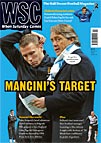 Winning the Welsh Cup was an achievement but a run in Europe was how a now-defunct team from Llandudno Junction made history. Owen Amos remembers Borough FC's outing in the 1963 Cup-Winners Cup
Winning the Welsh Cup was an achievement but a run in Europe was how a now-defunct team from Llandudno Junction made history. Owen Amos remembers Borough FC's outing in the 1963 Cup-Winners Cup
The first Welsh club to win a European tie wasn’t Cardiff, Swansea or even Wrexham. It was Borough United, in the 1963-64 European Cup-Winners Cup. The Welsh Cup winners entered the Cup-Winners Cup every year, bar the first tournament, in 1960-61, when only ten teams entered. In 1961 Swansea Town (they became City in 1970) were beaten by East Germany’s Motor Jena. The year after Bangor City were beaten by Napoli, despite winning the first leg 2-0. Then came Borough.
Winning the Welsh Cup was, in itself, a huge achievement. Borough had no heritage. They were formed in 1954, after Llandudno Junction and Conway Borough merged, and played in the Welsh League North, with teams like Pwllheli, Penmaenmawr and reserve sides from Bangor, Rhyl and Wrexham. Back then the Welsh Cup was harder to win.
Now, only sides playing in Welsh leagues can compete. Then, Wales’ four Football League sides entered – Cardiff, Swansea, Wrexham and Newport County – as well as border sides. In 1963, when Borough won the cup, Hereford entered in round four and Chester in the next round. But Borough won, beating Newport 2-1 on aggregate in the two-legged final. Borough’s side included two players with League experience – centre-forward Gerry Duffy had spent two seasons with Oldham while full-back Eric Morris played one game for Chester.
The problems started once the party finished. According to Terry Grandin, author of Red Dragons in Europe, the club had just £4 at the start of the 1963-64 season. For Europe, they worked out, they needed £4,500. A raffle was organised with the first prize a bungalow built by a Borough supporter in Llandudno, worth £2,500. All 92 Football League clubs were asked to sell £5 worth of tickets. Eight clubs – it’s not known which – returned their tickets unsold. Everton, on the other hand, sent a cheque for £100.
In the first round Borough avoided, among others, Barcelona, Manchester United, Lyon and Hamburg, and were instead pitted against Sliema Wanderers of Malta. The 3,000-mile round trip was, to put it mildly, difficult. The plane from Liverpool was forced to land at Marseille, after engine trouble. The journey took 31 hours. The players arrived in Malta four hours before kick-off and asked for a 24-hour postponement, which was turned down.
The game was played on a Sunday, at Malta’s old national stadium in Gzira, and watched by 15,000, which included sailors from the Royal Navy based on the island. Borough drew 0-0. The return leg was played almost three weeks later, at Wrexham’s Racecourse Ground. More than 17,000 turned up. Borough scored in the first half, before Mike Pritchard – a 19-year-old insurance clerk – scored a second. They held on to create Welsh football history. Even better news came afterwards: the gate receipts were almost £3,000 and Wrexham waived their fee.
In the second round, played two months later, Borough faced Slovan Bratislava. The home leg, once more, was at the Racecourse Ground; the attendance, on a Wednesday in December, was 10,000. Slovan’s squad included nine full internationals, among them midfielder Jozef Venglos, who went on to manage Aston Villa and Celtic, and defender Jan Popluhar, who played in the 1962 World Cup final and was voted Slovakia’s best player of the 20th century.
These famous names, and their team-mates, were treated to a civic reception from the Mayor of Conwy before the game. Borough only lost 1-0. The away leg – watched by 6,000 fans, including 30 who travelled from Wales – saw Borough lose 3-0, but the Czechoslovakian players clapped their opponents from the snow-dusted field. Slovan lost to Celtic in the next round, the quarter-finals, and Sporting Lisbon won the competition, beating MTK Budapest 1-0 in a replay in Antwerp.
Not all Borough’s cup runs that season were as glamorous. They also entered the FA Cup, as other Welsh teams did, but lost in the second qualifying round to New Brighton.
For Borough, 1963 was as good as it got. They never won the Welsh Cup again and in 1967 the Dublin-based Catholic order who owned their Nant-y-Coed ground in Llandudno told them to leave. Without a home, they withdrew from the Welsh League North, into the Vale of Conwy League, but folded in 1969. The Catholic order did nothing with the ground.
Today, the senior team in the Conwy area are Conwy United, who play in the Welsh Alliance, two leagues below the Welsh Premier. The nearest they came to Borough’s adventure was in 1996, when they played four games in the Intertoto Cup group stage, including an excellent 0-0 draw against Charleroi. Llandudno play in the Cymru Alliance, one below the Welsh Premier League, and have never played in Europe. But the area has football heritage. Borough United – the team that lasted 15 years and weren’t named after a place – see to that.
From WSC 276 February 2010